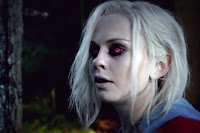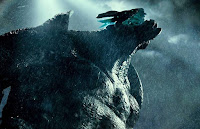Y’know, I just noticed that there hasn’t been a single comment here in weeks. Not sure if that’s because more people are leaving comments over on Twitter when I link to these… or if I just haven’t been that interesting.
…let me know down in the comments.
Anyway, I’m a bit short on time—the past few weeks have been a bit crazy for me—but I still wanted to get something up here. And I realized there was a topic I hadn’t talked about in a while. Not in any detail, anyway…
One of the basic parts of storytelling is the
obstacle.
It’s what stands between my characters and whatever they want. Maybe they want to save the farm, but they’re too far in debt and can’t raise the money in time.
Maybe they want the super-bedazzled mitten, but there’s a big purple guy with his own army who also wants it.
Maybe they
just want to ask that cute barista if she’d like to, I don’t know, get some coffee sometime or… no, wait, that’s stupid. Auugggggh, I have to go hide for at least a year. And maybe change my name.
Anyway…

Personally, I think an obstacle’s slightly different from a conflict.
It’s just terminology, yeah, but exterior problems tend to be called obstacles, while interior ones are almost always labeled as conflicts. Captain Marvel wants to save Earth from an alien invasion (obstacle), but first she needs to come to terms with the fact that her adoptive alien race, the Kree, may have been lying to her for years about a lot of stuff (conflict).
See what I mean?
Because of this, I prefer the overall term
challenge.
I find that thinking about “obstacles” tends to make me think more about physical things in the way of my heroes, like parts of an obstacle course.
And, again, while this isn’t technically wrong, it tends to lead to a lot of the same things in my writing.
This is when I get challenges
with more of an episodic, low-end videogame feel to them.
My character defeats obstacle A then moves on to obstacle B, obstacle C and finishes up with D.
So here are a few thoughts about challenges, external and internal, that might be worth thinking about
while I’m planning out my story—whether I’m writing a novel, short story, screenplay. or six-part epic somethingorother. I’ve mentioned them once or twice before, so if they sound familiar… good job.
You’ve been paying attention
First Thought– I must have a challenge
I’m sure we’ve all run into books or movies where people either sit around doing nothing or just
meander through events with little to no effort.
If the character needs something, they either already have it in their backpack or it’s in the first box they open. If they need help, people are always
able and willing.
Any lucky break that has to happen does happen just when they need it to.
I know these examples sound silly, but it’s stunning how often I see this happen in screenplays and/or books.
There needs to be something between my characters and their goals.
If there isn’t,
they would’ve accomplished these goals already.
Look. I just got up and made myself a drink. I wanted one. I got it. Heck, if I hadn’t said anything you never would’ve known. That’s just not the stuff we see as bestselling, high-stakes drama.
Second Thought–My characters need a reason to confront said challenge.

If my characters are going to take on a challenge,
they need a reason to do it. If I’ve spent the past four days walking through the desert, getting that drink is probably a life-or-death thing for me. Captain Marvel isn’t pursuing the Skrulls as a part time hobby—it’s
her sworn duty as an officer of the Kree military. I need to make sure this reason is really there.
It might be clear in my head why the characters are going to undertake a challenge, but is it clear on the page?
This is doubly true for internal things, which can be a lot more subtle depending on
what point of view I’m using
Third Thought—My challenge needs a reason to exist.Like I said right at the start, I need to have some kind of challenge, but I don’t want a challenge that only exists to be a challenge. It’s got no reason for existing in the world of my story, no past, no future, no motivation. It’s only there to serve as an obstacle for the protagonist to overcome. We can probably all think of a book or movie where, for no reason at all, an obstacle just popped out of nowhere. That kind of stuff just weakens any story.
Challenges have a purpose.
Whether they’re the driving force behind my story or minor distractions my characters need to deal with quick, they’re a kind of antagonist—
something or someone working against my heroes. That oasis is the only source of water for a hundred miles in this desert, which is why the people who used to live here set so many guards to protect it. There’s also a reason the Skrulls are on Earth (they’re searching for a hidden lab) and there’s a reason they’re tough to find (they’re shapechangers). I need to think about why a challenge is in my story, and if there isn’t a real reason… maybe re-think it
.
One other note. I think it’s generally better if my audience (reader or viewer) has at least some idea why this challenge exists. They don’t need to know all the details immediately (or even accurately), but I also shouldn’t be saving them for a last-page reveal.
Fourth Thought—My challenge needs to be daunting.

Not only am I weak from dehydration and facing ten armed guards around the oasis, the actual spring itself is
booby-trapped. Someone centuries ago built all sorts of pressure plates around the thing and I’m not exactly in the best condition right now to be tip-toeing and balancing through this spike-launching mine field. Plus, if Captain Marvel can’t find the Skrull agents on Earth, they could establish a foothold here, rebuild their strength, and endanger peace throughout much of the galaxy.
This may be a weird way to look at it, but challenges are things we needto deal with, but we don’t want to deal with. My characters don’t want to deal with this because they don’t even want to be in this situation. I think we can all agree things would be a lot easier if that challenge wasn’t even there.
But it is there, so… goddammit…
Fifth Thought—My challenge can’t be impossible.
Okay, we all write fiction. But even within a fictional world there are things that just can’t happen. Normal people can’t
punch out gods or outsmart supercomputers. And if all those guards around the oasis have motion sensors, night vision goggles, and shoot to kill orders, there’s very little I’m going to get—holy crap there’s
fifty guards? I thought there were only ten. And when did they all get machine guns?
If you’ve ever watched a horror movie where the killer is merciless,unstoppable, and inescapable… well, that gets pretty dull after the second or third kill, doesn’t it? One of the reasons Jason Voorhees was scary is that he never ran. He just sort of… marched? Lumbered? It always felt like somebody could get away from Jason if they could just go a littlefaster. If it feels like there’s no chance, it’s not interesting. We already know the outcome.
There are two
other issues with the impossible challenge.
One is if I make my challenge out to be completely impossible and my hero pulls it off anyway, there’s a good chance it’s
going to knock my audience out of the story. I’ve just shattered the rules of
what’s possible in my story. That usually means it’s “throwing the book across the room” time.
The second issue is when I have challenges that seem impossible to my characters, but have painfully obvious solutions to my readers. We just don’t like these characters, by nature of their stupidity, and that’s not going to win me any points.
Sixth Thought—Holy crap there are a lot of these
This was supposed to be a quick rehash of an old topic, but I keep finding things I want to add to this. I’ve got editing to do, dammit!
Seventh Thought—My challenge should be unexpected.
This isn’t a hill-I-will-die-on rule… but I’d be willing to fight on that hill for a little while. Once I admit that I need a challenge, it’s kinda the next logical step.
If my heroes are so prepared, so trained and equipped that they’re completely ready for this challenge… well, there isn’t really a challenge, is there? If they’ve covered all the angles, researched every possibility, how can they lose? And if they can’t lose… well, that’s kinda boring, isn’t it? We know the outcome again.

A standard part of so many stories—including
Captain Marvel— is
when something changes or goes wrong.
The one thing we didn’t prepare for happens. We learned something new that completely flips our goals and
understanding of the situation.
One way or another, the plan’s shattered into a million pieces. I beat the guards and made it past the booby traps and WHAT? There are albino crocodiles in the oasis? Wait, are these guys actually
poachers?
But think about it—when this happens in a story, it’s almost always the moment we love. It’s when my characters get to look good and show how smart or clever or tough they really are.
Eighth and Last Thought–I need to resolve my challenge
Once I’ve set up a challenge, it needs to be resolved somehow. I can’t crouch on a sand dune outside the oasis for five chapters studying the guards and their patrol patterns, then just wander off back into the desert. It leaves a lot of dangling threads and unanswered questions. Who were all those guys? How did they get here? Why did I give up when I desperately needed water?? How did I wander away if I was weak from dehydration? Why did the author spend five chapters on this if I was just going to wander away…?
To paraphrase Chekov, if we see a phaser on the bridge in act one, we need to see it on overload in act three. And then either disarm it or watch it take out the
Enterprise. Because if I just leave it there buzzing and getting hotter, readers are going to ask what happened. They remember this stuff.
And they will judge me on it.
Those are my way-too-many thoughts on challenges. Maybe take some time and look at the challenges your own characters are facing. Are there any? Are they challenging enough? Does your character have a desire to avoid them and a need to face them?
Next time, speaking of challenges, I’m going to do something I’ve tried really hard to avoid here for years. I’m going to go negative.
Until then… go write.
 Personally, I think an obstacle’s slightly different from a conflict. It’s just terminology, yeah, but exterior problems tend to be called obstacles, while interior ones are almost always labeled as conflicts. Captain Marvel wants to save Earth from an alien invasion (obstacle), but first she needs to come to terms with the fact that her adoptive alien race, the Kree, may have been lying to her for years about a lot of stuff (conflict). See what I mean?
Personally, I think an obstacle’s slightly different from a conflict. It’s just terminology, yeah, but exterior problems tend to be called obstacles, while interior ones are almost always labeled as conflicts. Captain Marvel wants to save Earth from an alien invasion (obstacle), but first she needs to come to terms with the fact that her adoptive alien race, the Kree, may have been lying to her for years about a lot of stuff (conflict). See what I mean? If my characters are going to take on a challenge, they need a reason to do it. If I’ve spent the past four days walking through the desert, getting that drink is probably a life-or-death thing for me. Captain Marvel isn’t pursuing the Skrulls as a part time hobby—it’s her sworn duty as an officer of the Kree military. I need to make sure this reason is really there. It might be clear in my head why the characters are going to undertake a challenge, but is it clear on the page? This is doubly true for internal things, which can be a lot more subtle depending on what point of view I’m using
If my characters are going to take on a challenge, they need a reason to do it. If I’ve spent the past four days walking through the desert, getting that drink is probably a life-or-death thing for me. Captain Marvel isn’t pursuing the Skrulls as a part time hobby—it’s her sworn duty as an officer of the Kree military. I need to make sure this reason is really there. It might be clear in my head why the characters are going to undertake a challenge, but is it clear on the page? This is doubly true for internal things, which can be a lot more subtle depending on what point of view I’m using Not only am I weak from dehydration and facing ten armed guards around the oasis, the actual spring itself is booby-trapped. Someone centuries ago built all sorts of pressure plates around the thing and I’m not exactly in the best condition right now to be tip-toeing and balancing through this spike-launching mine field. Plus, if Captain Marvel can’t find the Skrull agents on Earth, they could establish a foothold here, rebuild their strength, and endanger peace throughout much of the galaxy.
Not only am I weak from dehydration and facing ten armed guards around the oasis, the actual spring itself is booby-trapped. Someone centuries ago built all sorts of pressure plates around the thing and I’m not exactly in the best condition right now to be tip-toeing and balancing through this spike-launching mine field. Plus, if Captain Marvel can’t find the Skrull agents on Earth, they could establish a foothold here, rebuild their strength, and endanger peace throughout much of the galaxy.
 A standard part of so many stories—including Captain Marvel— is when something changes or goes wrong. The one thing we didn’t prepare for happens. We learned something new that completely flips our goals and understanding of the situation. One way or another, the plan’s shattered into a million pieces. I beat the guards and made it past the booby traps and WHAT? There are albino crocodiles in the oasis? Wait, are these guys actually poachers?
A standard part of so many stories—including Captain Marvel— is when something changes or goes wrong. The one thing we didn’t prepare for happens. We learned something new that completely flips our goals and understanding of the situation. One way or another, the plan’s shattered into a million pieces. I beat the guards and made it past the booby traps and WHAT? There are albino crocodiles in the oasis? Wait, are these guys actually poachers?







